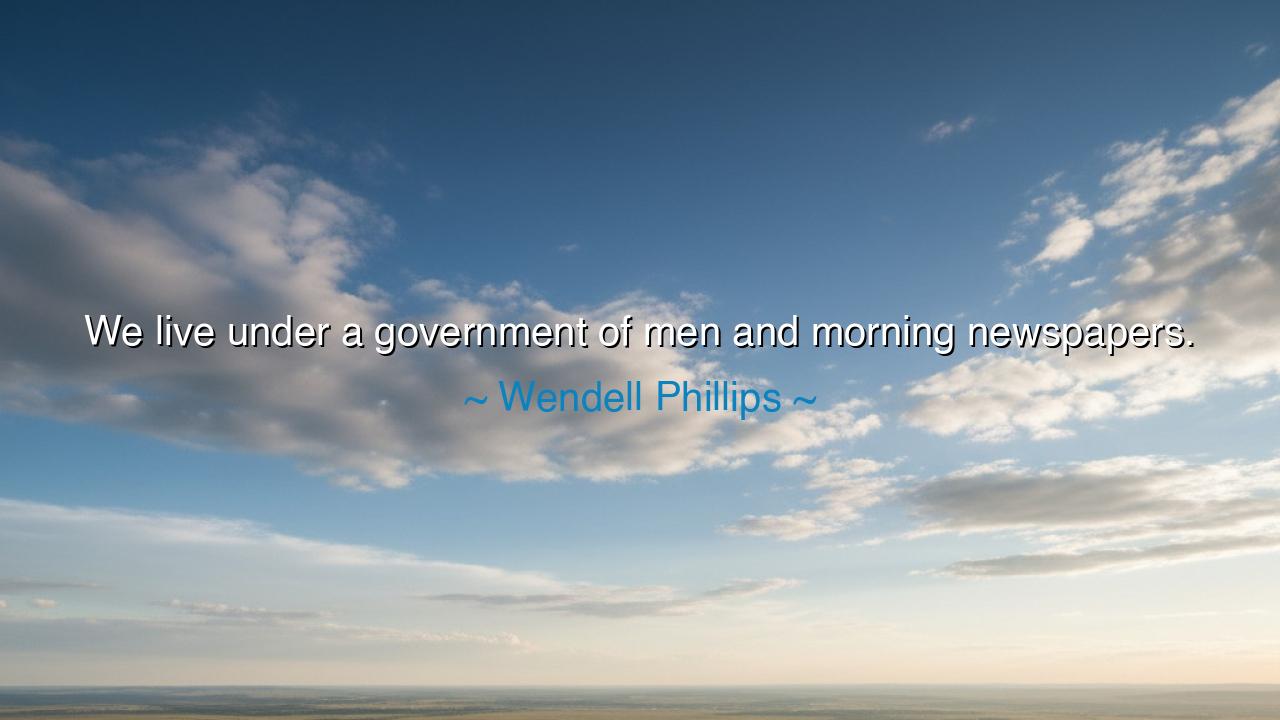
We live under a government of men and morning newspapers.






In the age of ink and iron, when words began to move nations faster than armies could march, Wendell Phillips, the fiery abolitionist and orator of nineteenth-century America, spoke a truth both piercing and prophetic: “We live under a government of men and morning newspapers.” With this, he unveiled not merely a jest about politics and press, but a profound reflection on the nature of power, influence, and the restless spirit of public opinion. For Phillips, who lived in an era when slavery’s chains were being shattered and democracy itself was being tested, knew that the rulers of a nation are not found only in marble halls — they are also found behind the printed page.
The origin of these words lies in Phillips’s lifelong struggle for justice and equality. He was a man who wielded speech as a weapon sharper than any sword, who understood that in the new age of democracy, it was not the king’s decree nor the priest’s sermon that most shaped the hearts of men — but the newspaper. Each dawn, as the presses thundered and the papers spread across the land, the common man awoke not to orders from his government, but to the whispers and roars of the written word. Phillips saw that this daily tide of news could raise truth to the heavens or drag it through the mud, could ignite revolution or lull a nation to sleep. Thus, when he spoke of a “government of men and morning newspapers,” he meant that the fate of a republic lies as much in the hands of those who tell its stories as in those who write its laws.
To understand the weight of his words, one must look upon the history of nations that have been ruled not by tyrants alone, but by the sway of public voice. Recall the French Revolution, when pamphlets and papers fanned the flames of liberty until they burned beyond control. Or think of the American abolitionist movement, in which Phillips himself played a sacred part — a movement fueled not by swords, but by the printing press. Each page cried out against the sin of slavery, carrying truth where chains could not reach. Yet, just as the press liberated, it could also deceive. Phillips saw that the same paper which exposed injustice could also sanctify lies if men of weak conscience held the pen.
Thus, his quote is both a celebration and a warning. It celebrates the power of communication, that divine gift which allows truth to leap from one heart to another. But it also warns that when the press becomes corrupted, when it seeks favor instead of truth, then the people become slaves not to kings, but to illusion. In such times, governments are shaped not by wisdom, but by the fever of headlines, and the destiny of a nation turns on the fickle winds of rumor and sensation. Phillips, who loved liberty above all, feared that democracy might perish not by the sword, but by the pen unguarded by conscience.
Even in our own time, his words still blaze with meaning. We live no longer under the rule of morning newspapers alone, but under the vast dominion of media and machines, where voices rise and fall in the span of seconds. The screens that glow in every hand now serve as the new printing press — powerful beyond measure, yet perilous in their reach. We are governed, as Phillips foresaw, not only by elected men and women, but by the unseen force of narrative — by what is told, repeated, believed. And if truth is lost amidst the noise, then freedom itself grows frail.
The lesson of Wendell Phillips is timeless: seek truth before opinion, and conscience before comfort. Governments rise and fall, newsmen come and go, but truth is eternal. The wise citizen must not be ruled by the fleeting storms of rhetoric or the manipulations of power, but must learn to question, to discern, and to think. As the ancients taught, the mind of a free man must be a fortress, not a sponge. The press may inform, but only conscience can guide.
Therefore, let us take up Phillips’s charge as a sacred duty. Read, but read with reason. Speak, but speak with integrity. Listen, but listen with discernment. Do not let your beliefs be shaped solely by the morning newspapers, nor your liberty be governed by the shifting passions of men. For the truest government is not that of kings, congresses, or editors — it is the government of character, ruled by truth, sustained by courage, and defended by the vigilant heart of every free soul.
In the end, Wendell Phillips’s words call to us across time: guard the power of the written and spoken word, for in it lies the fate of nations. A people who think for themselves can never be enslaved — but those who surrender their minds to the voices of others live forever under a government of men… and morning newspapers.






AAdministratorAdministrator
Welcome, honored guests. Please leave a comment, we will respond soon